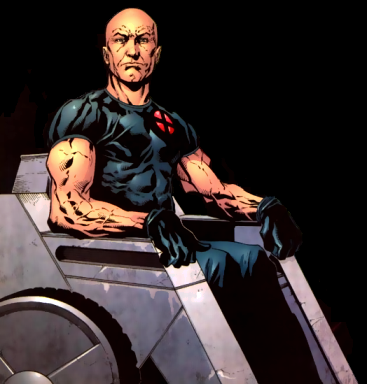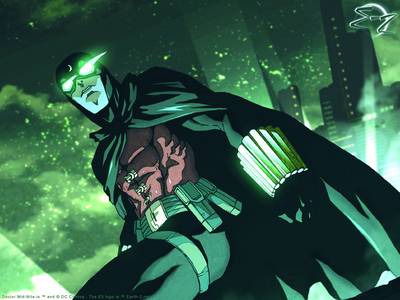Hey Comic Book Writers! Stop “Curing” Our Disabled Heroes!
Over the years, there have been many comic book heroes who are/have been disabled. Here’s the thing, though: as we all know, what dies in comic books (even if it’s the use of a body part), doesn’t always stay “dead”, and it pisses me right off. Let me give you some examples.
Charles Xavier / Professor X

Who DOESN’T know about Professor X??? Through the use of his superior intellect, political pull, skills as a tactician (and of course his mutant power of telepathy), Professor X strove for the rights of all mutantkind, and the inclusion of mutants into the world of humanity.
The founder & leader of the X-Men, and one of the most brilliant minds in the Marvel Universe; Professor Charles Francis Xavier lost the use of his legs when the alien known as “Lucifer” dropped a huge stone block on him. Since that time, the image of Xavier’s paraplegia has changed very little – the main difference being only the wheelchairs he has used – and the character has become one of the most widely-used symbols for overcoming disability in all of comicdom.
However, Professor X’s paraplegia hasn’t always stayed a constant in the Marvel Universe. For instance: in the very same issue in which Xavier became paralyzed, Beast built a “distortion device” which actually negated the professor’s extensive injuries; thus allowing him to walk (a silly trope, but it was a sign of the times). Additionally, near the tail end of the X-Cutioner’s Song story arc, Apocalypse cured Professor X of the Legacy virus (after being infected by the mutant known as Stryfe), which temporarily granted him the ability to walk again.
Dr. Mid-Nite

Widely regarded as the first character in comic books to have a physical disability (his first appearance was in All-American Comics #25 in 1941), While operating on a witness who was set to testify against the mob, Dr. Charles McNider (Dr. Mid-Nite’s first alter-ego) was wounded by a grenade thrown into the room by a mobster, resulting in his “inverted vision” – meaning he cannot see in sunlight, but has superhuman vision at night/in the dark.
The mantle of Dr. Mid-Nite/Doctor Midnight has been assumed by 3 different individuals in the DC Universe (Charles McNider, Beth Chapel, and Pieter Cross). Each of them has been blinded in some way, resulting in them taking the titular name, and fighting crime while using roughly the same abilities.
Per comic norms, however, Dr. Mid-Nite (the Pieter Cross version) was cured of his blindness by the god known as Gog, in the Justice Society of America book, Thy Kingdom Come. Unlike other times that “cures” have happened, however, this one came at a price. As a direct result of his sight being restored to “normal”, Dr. Mid-Nite was unable to perceive the injuries of a member of the JSA as well as he would have with the help of his inverted vision, and the soldier died from his wounds.
Oracle / Barbara Gordon

Probably the most highly visible disabled comic book character, the former Batgirl lost the use of her legs when she was shot in the spine by the Joker in Alan Moore’s famed book, The Killing Joke. Rather than succumb to the depression that so often plagues victims of paralysis borne from an accident or crime, Barbara Gordon steeled herself & proved to the world that she was still able to fight crime – albeit in a different capacity – as the brilliant computer hacker & information broker known as Oracle.
Author T. James Musler wrote a book called Unleashing the Superhero in Us All, in which he said of Barbara Gordon’s transformation into Oracle, “No longer is a handicap overwhelming, a person can live a strong good life, handicap or not”. Also, in The Superhero Book: The Ultimate Encyclopedia of Comic Book Icons and Hollywood Heroes, author Gina Renée Misiroglu called Oracle, “the most empowering disabled superhero”, because she rose above her disability and become a huge asset to Batman through the use of her intellect & caring personality. Nthat Oracle also serves as an illustration that disabled women can be beautiful and intelligent.
In 2011, however, DC decided to reinvent many of their characters for The New 52. This resulted in Barbara Gordon regaining the use of her legs, and taking up the mantle of Batgirl once again, after 3 years of being wheelchair-bound. This revelation ended up being quite controversial in the Batman fan community. There were a lot of readers who really wanted her to remain DC’s highest-profile disabled character (journalist & blogger Jill Pantozzi called the move “the most disrespectful I’ve seen in a long time”), and others who thought that she should go back to being Batgirl, as she was the most famous.
Let’s examine what we’ve seen here. Superheroes with disabilities are an important representation of a minority population. They give readers who have disabilities something to identify with. Therefore, taking away the one thing that separates them from the rest of the superhero community only serves to alienate that fan base. I, for one, would love to see this trope go away permanently. As a person with a lifelong disability, I want characters who represent what it means to have a disability, and to not be forced to swallow some garbage about a magical “cure” that breaks the immersion of the character. As Oracle is fond of saying, “Don’t let the wheelchair fool you. [She] can still kick your ass”. So, I urge all comic book fans in the disability community to contact the creators, writers, and artists for your favorite disabled heroes, and demand that they keep them the way they are: PERFECT.


Barbra is better as Batgirl than Oracle. She was wasted those years. Plus there is still professor X & Daredevil & the like
LikeLike
Wasted? So are you implying that being in a wheel chair is “wasted” Literally Professor X and Daredevil are the only two disabled heroes I can name. Why not represent a portion of society and also have a character disabled people can relate with. Oracle > Batgirl
LikeLiked by 1 person
What criteria are you using to imply that she is “better” as Batgirl than as Oracle? Is she not was successful a crime-fighter because she couldn’t walk? Have you seen the books in which she kicks major ass from her wheelchair? In addition, having someone with that ENCYCLOPEDIC knowledge of computer systems at one’s side (as she was for Batman) could be a huge help to anyone.
LikeLiked by 1 person
I actually work with the disabled as my career (Direct Support Professional) so your post title caught my eye. I think this was a very thoughtful read. Part of my job is to help individuals overcome their disabilities, no matter how severe they are, so that they can be a functioning and contributing part of society. Sadly, though I enjoy comic books, there are many ways in which their thinking is fundamentally out-dated. Superman will always be super, and his physique reflects that. But I wholeheartedly agree that impaired individuals who happen to be comic book characters should remain in their impairment as a part of what makes them heroic. Of course comic writers have the freedom to write what they want without having to cater to any minority, but a woman in a wheelchair who was shot by a serial killer and still continues to do what she can to fight crime is an image with incredible impact.
Thanks for your article!
thewellredmage.wordpress.com
LikeLiked by 2 people
Yeah, umm… Barbara had incomplete Paraplegia of the class which would typically be healed through 1-2 years of Physical Therapy. She did NOT have complete Paraplegia.
Your entire argument is baseless.
LikeLike
The argument is only baseless, if you think the author is arguing that recovery never happens in the real world, and the comic is thus medically unsound. You have missed the point.
I’m going to guess that the commenters on here going “No, everything’s fine, you’ve got Professor X, leave our comics alone” are probably abled.
In the real world, there are people who are born disabled, who will die disabled. Others who will acquire a disability which changes their lives forever. People seem to think this is a negligibly small group of people – it is not. 19% of people in the UK have a disability. The reason people think it is so rare, is that we so rarely are represented.
It is not too much to ask, that we should occasionally get to be heroes, too.
LikeLiked by 3 people
Thank you very much for the insight, Kevin.
LikeLike
The under-representation is definitely one of the key points I was attempting to make here. There are WAY more people with disabilities (visible & invisible) in the world than most able-bodied folks may realize.
LikeLike
I have questions… But first,I thought the purpose of comics was to entertain – not reflect on all the problems we live with every day.
That being said, Wouldn’t anyone who has ever had the use of their legs, then lost it, not want them back? Why does the comic book world have to reflect the real one perfectly? Why do characters have to become and stay any one thing? Would that not be limiting the characters themselves?
I could go on. Back when I first started reading Iron Man, Tony Stark was paralyzed. His armor was basically designed to help him walk – among other things. I didn’t give a damn that he was paralyzed. Even at that young age when the world was less politically correct. Know what I gave a damn about? Whether or not Iron Man kicked ass.
Immediately below this post on my Facebook feed is a story about how fiction is just one of hundreds of ways disabled people are told their lives have less meaning. I call bulls**t. Why? Because the first sentence of that rant starts out calling them disabled. Looks like that author for the Guardian already thinks of them as less than people to me.
Basically, Why in the hell can’t people just enjoy the comics? I read books and comics to get away from the real world. I already know that Harry Dresden isn’t going to save Chicago (and the world). In my mind, all articles like this do is try to limit fiction.
I have a seizure disorder. It has kept me from doing a lot of things in my life – such as joining the military. I’ve got scars all over the place of times I’ve gone down in a seizure. There is no cure. I can only stop the seizures by religiously taking my medication. Those seizures have limited me some in real life, but not in fictional worlds. I can be anyone in my mind – do anything that comes to mind. What’s wrong with a fictional world where some aliens show up and introduce nanotechnology which will correct the damage in my brain which causes seizures?
As I wrote this the image of a little girl in a wheelchair came to mind. She’s reading a Captain Marvel comic, and dreaming of one day becoming Captain Marvel. Then, some adult comes by and snatches the comic out of her hands, and tells her she’s stuck in that chair for life so she shouldn’t be daydreaming.
LikeLike
I respect a lot of what you are saying here, but having read the other article you refer to, something you have said bothers me.
“I call bulls**t. Why? Because the first sentence of that rant starts out calling them disabled. Looks like that author for the Guardian already thinks of them as less than people to me.”
Well – no. Only if you think that “disabled” is a dirty word. The author is disabled. I am disabled and work with people with disabilities. There may be a degree of cultural misunderstanding here – I am in the UK, and I don’t know where you are based – but the majority of people with disabilities, happily self-identify as “disabled”. It is not a slur, it is merely an accurate description. That you see the word and immediately think “lesser”, says more about your mindset, than the author’s, I’m afraid.
LikeLiked by 2 people
I love this article! I love having superheros being relate able to actual people. Tony Stark has extreme anxiety problems, and heart problems with mild alcoholism. We finally have our first middle eastern superheronies! She’s 17 on top of that! I say keep some super hero’s disabled. Marvels does a great job keeping it diverse, i hope they keep some of our heros disabled.
LikeLiked by 2 people
Doug T. If you would like to post further on this topic, please check the Neurodiverse City project on my Linkedin profile page
LikeLiked by 1 person
This is a fantastic article with one glaring omission (to me, anyway). You didn’t cover Daredevil, but considering the press he’s been getting because of the show it may not be necessary to keep bringing him up.
LikeLike
The problem is these characters go on forever. It only takes one writer, one editor to make the decision. Comics often have two simple narratives tugging at writers, neither of which I find artistically healthy, though they have marketing advantages.
First is the desire to fulfill the wishes of the character and/or the audience. That’s how Peter Parker went from high school nerd to the husband of a super-model. It’s why we got Richonne on The Walking Dead.We know Barbara would like to walk again. Give her what she wants, make the fans happy. Dramatically this is awful, but it is an understandable impulse.
The second is the reset switch. Nothing in comics is permanent. In part this is a marketing concern. Everyone loved Jean Gray – bring her back! In part it is a way to undo the damage a bad (or simply unpopular storyline) inflicted. No – really, Ben Reilly was the Clone all along! Often its a way for the writer to write the character he grew up with, so even though he’d been dead over 2 decades, we had to bring back Barry Allen. And if things like Life and Death are completely meaningless in comics, what do you think it means of paralysis?
Really, once the brought back Barry Allen, Bucky, and Jason Todd, no one should have been shocked to see Barbara Gordon get her legs back. Everything in comics history said it would happen. At least with Xavier, he was created a paraplegic, and the same “reset switch” mentality means he will always end up back in the chair. But only that – he’ll never lose a limb or get a scar or IBS. Because that’s just how comics work.
LikeLike
I did not cover Daredevil because he’s never really been “cured” of his blindness, to my knowledge. If I missed an issue in which he was, please point me to it, as I would love to read it.
LikeLiked by 1 person
Reblogged this on Rambling Justice.
LikeLiked by 1 person
hello my good friend is launching with a charity, the first mainstream comic featuring disabled superheroes this summer at Hamleys in London. Known as Department of Ability you should check his work out!
LikeLike